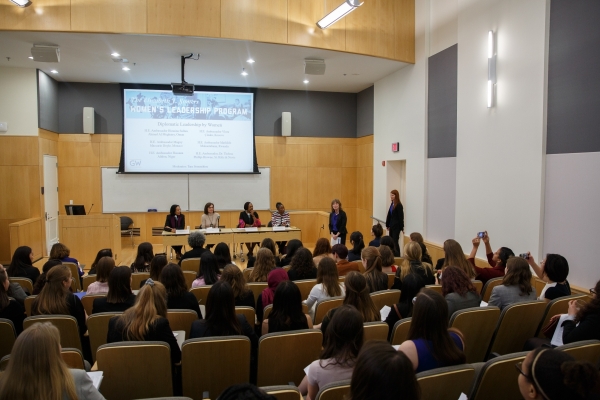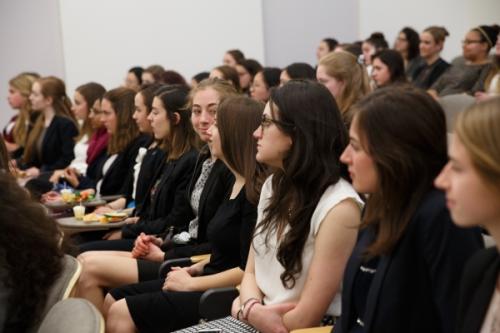We had the great privilege of meeting with four women who serve as ambassadors to the United States from four different countries: Mathilde Mukantabana from Rwanda, Hunaina Sultan Ahmed Al Mughairy from Oman, Maguy Maccario Doyle from Monaco, and Thelma Phillip-Browne from St. Kitts & Nevis. I was part of the small group that got extra time to speak directly with Ambassador Dr. Phillip-Browne, who asked us to introduce ourselves and invited us to ask as many questions as we could. She explained to us a bit about her country’s history and current challenges, as well as her own path to leadership.
Ambassador Dr. Phillip-Browne’s career spanned across academic and occupational fields, quickly overturning my belief that a degree in politics or international studies was the surest way to become an ambassador. In complete contrast to my expectation, her main occupation before being appointed was as a dermatologist, but she became involved with politics and for an assembly seat because she wanted to help shape her country’s future. She lost the election, but was then appointed as an ambassador. Her main concerns that she related to us were about climate change, racial equality, and gender equality.
Once we got to hear all of the ambassadors, however, it became clear each had different backgrounds, priorities, and attitudes toward the positions they held. Ambassador Maguy Maccario Doyle from Monaco spoke about studying marketing, leaving her small country to see more of the world, and now using her communicative skill and cross-cultural experience to promote Monaco as she would a brand. Ambassador Hunaina Sultan Ahmed Al Mughairy from Oman, who is notably the first Arab woman ambassador to the United States, came from a background of economics and became involved in politics by helping negotiate trade agreements and investment development. Mathilde Mukantabana from Rwanda was forced to flee her country as a young girl and after attending college in the United States, now serves to help her country heal from the conflict that forced her into exile.
All of these women agreed that they did not plan on being ambassadors; they pursued their different areas of expertise and then were appointed ambassadors because of their unique expertise. Each country they represent has different needs and faces different challenges that they are uniquely suited to address. They do not seek to lead in every aspect, but have instead developed communication skills that they all agreed are vital to collaborating with experts from all different fields and negotiating cross-culturally to represent their country.
From their leadership experience, it reminded me of a saying: “You don’t need to be the best at everything, you only have to find one thing you can do that no one else can.” I believe I heard this from a guest speaker on leadership in high school, and I continue to hear this advice repeated through the many leaders who visit the WLP. The ambassadors reminded us that each path to leadership is unique and builds upon each leader’s individual strengths, and that communication and collaboration are vital so that leaders can work together. By collaborating with others, we can learn from others’ strengths and share our own expertise to create a shared base of knowledge greater than any we could have on our own.
Devi Deane-Polyak, IAC 2017-18







